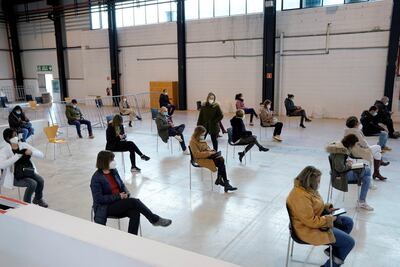A senior German minister wants coronavirus restrictions relaxed for people who have been vaccinated.
Other members of the German government are calling for measures to be tightened, including tougher border controls to keep out mutant strains of the virus.
National and regional leaders are due to meet on Tuesday to decide whether to impose new measures.
Foreign Minister Heiko Maas, however, suggested that people who had been inoculated against the virus should be able to go back to restaurants and cinemas before others.
"It has not yet been conclusively clarified to what extent vaccinated people can infect others," he told the Bild newspaper.
"What is clear, however, is that a vaccinated person no longer takes a ventilator away from anyone. This removes at least one central reason for restricting fundamental rights."
About one million people in Germany had been vaccinated as of Friday, the Robert Koch Institute said.
Government spokesman Steffen Seibert said the country still faced a major risk from new strains of the virus and scientists would be carrying out more genome sequencing to identify further mutations.
In future, health labs will have to sequence 5 per cent of the samples they collect when screening for coronavirus to check if they match more virulent strains first identified in Britain and South Africa, or if new mutations are emerging in Germany.
Mr Seibert said tougher cross-border checks were also being considered to keep new strains at bay.

Elsewhere in Europe, Spain began administering second doses of the vaccine to care home residents.
By Monday morning, eight of the country's 17 regions had started the second round of vaccinations, the health ministry said.
Though vaccination is voluntary in Spain, a court in the southern city of Seville authorised a care home to vaccinate a severely incapacitated 86-year-old woman, despite her son's objections, in the second such ruling in a week.
The judge presiding over the case said protecting public health must take precedence over family concerns.
"It appears to be the only effective option to adequately safeguard her life against the real risk of developing a serious Covid-19 infection," the ruling read.
In the UK, more than four million people have been vaccinated, prompting health officials to extend the programme to over-70s on Monday.
Vaccine Minister Nadhim Zahawi suggested the drug would next be offered to teachers, police officers and supermarket workers, who all face a relatively high risk of infection.

